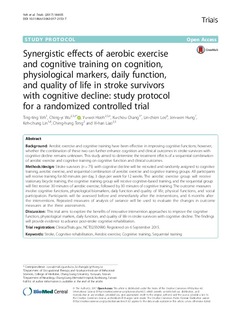| dc.contributor.author | Yeh, Ting-ting | |
| dc.contributor.author | Wu, Ching-yi | |
| dc.contributor.author | Hsieh, Yu-wei | |
| dc.contributor.author | Chang, Ku-chou | |
| dc.contributor.author | Lee, Lin-chien | |
| dc.contributor.author | Hung, Jen-wen | |
| dc.contributor.author | Lin, Keh-chung | |
| dc.contributor.author | Teng, Ching-hung | |
| dc.contributor.author | Liao, Yi-han | |
| dc.date.accessioned | 2019-02-22T13:34:29Z | |
| dc.date.available | 2019-02-22T13:34:29Z | |
| dc.date.issued | 2017 | |
| dc.identifier.citation | Ting-ting Yeh et al. (2017). “Synergistic effects of aerobic exercise and cognitive training on cognition, physiological markers, daily function, and quality of life in stroke survivors with cognitive decline: study protocol for a randomized controlled trial”. Trials201718:405. | nb_NO |
| dc.identifier.uri | http://hdl.handle.net/11250/2587068 | |
| dc.description.abstract | Background: Aerobic exercise and cognitive training have been effective in improving cognitive functions; however, whether the combination of these two can further enhance cognition and clinical outcomes in stroke survivors with cognitive decline remains unknown. This study aimed to determine the treatment effects of a sequential combination of aerobic exercise and cognitive training on cognitive function and clinical outcomes.
Methods/design: Stroke survivors (n = 75) with cognitive decline will be recruited and randomly assigned to cognitive training, aerobic exercise, and sequential combination of aerobic exercise and cognitive training groups. All participants will receive training for 60 minutes per day, 3 days per week for 12 weeks. The aerobic exercise group will receive stationary bicycle training, the cognitive training group will receive cognitive-based training, and the sequential group will first receive 30 minutes of aerobic exercise, followed by 30 minutes of cognitive training. The outcome measures involve cognitive functions, physiological biomarkers, daily function and quality of life, physical functions, and social participation. Participants will be assessed before and immediately after the interventions, and 6 months after the interventions. Repeated measures of analysis of variance will be used to evaluate the changes in outcome measures at the three assessments.
Discussion: This trial aims to explore the benefits of innovative intervention approaches to improve the cognitive function, physiological markers, daily function, and quality of life in stroke survivors with cognitive decline. The findings will provide evidence to advance post-stroke cognitive rehabilitation. | nb_NO |
| dc.publisher | Trials | nb_NO |
| dc.rights | Navngivelse 4.0 Internasjonal | * |
| dc.rights.uri | http://creativecommons.org/licenses/by/4.0/deed.no | * |
| dc.subject | stroke | nb_NO |
| dc.subject | cognitive rehabilitation | nb_NO |
| dc.subject | aerobic exercise | nb_NO |
| dc.subject | cognitive training | nb_NO |
| dc.subject | sequential training | nb_NO |
| dc.title | Synergistic effects of aerobic exercise and cognitive training on cognition, physiological markers, daily function, and quality of life in stroke survivors with cognitive decline: study protocol for a randomized controlled trial | nb_NO |
| dc.type | Journal article | nb_NO |
| dc.source.volume | 18 | nb_NO |
| dc.source.journal | Trials | nb_NO |
| dc.source.issue | 405 | nb_NO |
| dc.identifier.doi | https://doi.org/10.1186/s13063-017-2153-7 | |

